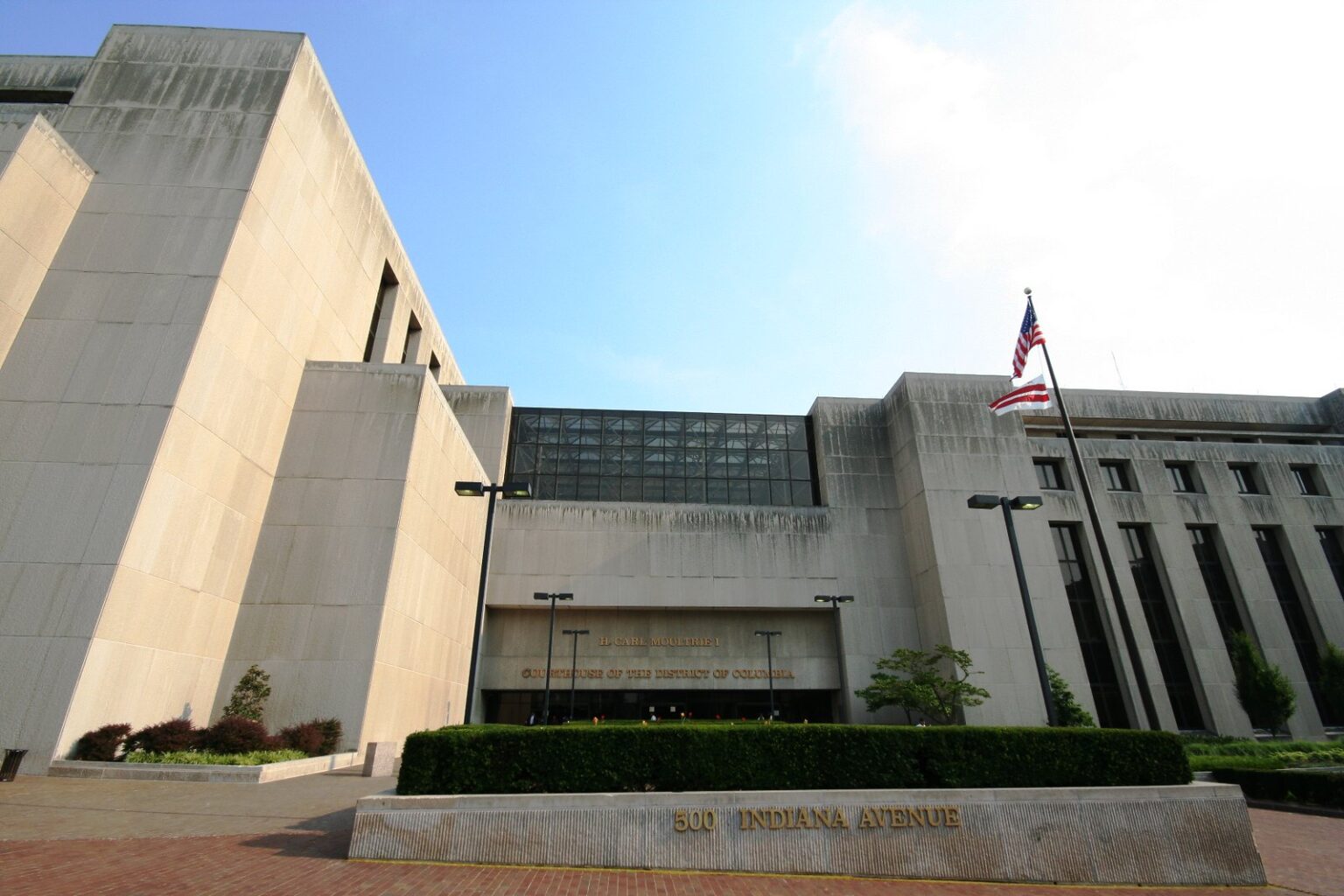Twelve years ago, a right-wing blogger published a post comparing a respected climate scientist to an infamous child molester.
Last week, Rand Simberg took the stand in a dark-paneled Washington, D.C., court room under glaring fluorescent lights, to defend himself in the defamation suit brought against him by the scientist he targeted, University of Pennsylvania researcher Michael Mann. Conservative blogger Mark Steyn is his co-defendant at the trial, which began on January 17.
Taking the stand on Tuesday morning, two weeks into the trial, Simberg seemed to bristle as John Williams, Mann’s lawyer, sought to establish Simberg to the jury as a misinformed climate denier.
The tall, silver haired attorney drew the jury’s attention to Simberg’s attempts to discredit Mann’s famous “hockey stick” graph. Co-authored by Mann and two other colleagues in the late 1990s, the graph shows that global temperatures increased dramatically during the 20th century.
This research helped establish that burning fossil fuels has been the main driver of climate change, and the United Nations Intergovernmental Panel on Climate Change (IPCC) included the hockey stick graph in its 2001 assessment report on climate science.
Williams pointed out that even before the 2012 blog post, Simberg had singled out Mann’s work and attacked it as fraudulent — without providing any proof.
In one instance Simberg in 2010 called Mann a “liar and a charlatan,” on a Google email list called “CoolPeople.”
When Simberg protested that “no one accused Mann of falsification or fraud,” Williams noted that in his own deposition in the case three years earlier, Simberg had said that Mann was “deceitful” and a “fraud.”
Williams also reminded Simberg that in his deposition, he stated that hadn’t read Mann’s actual research papers on the hockey stick graph. “All you knew was that they were controversial,” he added.
“I’m not disputing this,” Simberg said in response
‘Hysterical, Lying Propaganda’
Williams also quizzed Simberg on other statements castigating climate scientists and activists. These included a 2010 post to CoolPeople in which he called for Mann’s research funding to be cut, and for climate scientists to be “drummed out of their so-called profession.”
In another blog post around the same time, Simberg had described former vice president Al Gore’s 2006 documentary film “An Inconvenient Truth” as “hysterical, lying propaganda.”
In the post, Simberg also stated that children shouldn’t watch the film because “it scared a whole generation of people to not want to have kids.”
In 2007, “An Inconvenient Truth” won an Oscar for best documentary, while Gore won the Nobel Peace Prize for his work raising awareness about climate change, along with the IPCC.
Williams then shifted the topic to the concept of scientific misconduct, describing attacks by Simberg that accused Mann “of manipulating data to reach misleading conclusions.”
He asked Simberg if he’d read the 2011 National Science Foundation (NSF) report that exonerated Mann of any wrongdoing — one of two independent investigations spurred by 2009’s “Climategate” email hack.
“That report was a mess,” Simberg testified. “It didn’t even mention Mann’s name,” and was badly written.
Simberg tried to maintain that he had not accused Mann of scientific misconduct back in 2012, although his blog post at the time charged the scientist with “data manipulation,” and claimed the NSF report was a “whitewash.”
Williams noted that in his deposition, Simberg allowed that the NSF’s findings held some truth, but considered his own judgment better than that of the inspector general who wrote the report, who he dismissed as a “politician.”
William’s questioning led Simberg to acknowledge that he knew nothing about the report’s author.
“I didn’t have to know who it was because all high-level government officials are politicians,” Simberg testified.
No Evidence of Scientific Misconduct
After lunch, Simberg took the stand again and his attorney, Victoria Weatherford, asked, “How are you doing?”
Simberg responded, “I’m sure I can think of other places I’d rather be.”
“We all can,” Weatherford responded, continuing a defense team tactic of reminding the jury members how much of their time has been taken up by a trial it has tried to portray as unnecessary.
Weatherford also played a 2010 video by Richard Muller, a University of California, Berkeley physicist, in which he agreed with allegations that Mann had manipulated data. Muller’s mocking tone in the video — which provided no evidence of scientific misconduct — sparked some laughter from supporters of Simberg and Steyn attending the trial.
Some of Muller’s research funding has been linked to billionaire businessman Charles Koch, head of Koch Industries and a longtime funder of efforts to promote climate denial.
On Wednesday afternoon, climate scientist John Abraham testified that in 2013, the allegations against Mann led him not to seek Mann’s help with a research project into global ocean temperatures.
He had considered asking Mann to help him publish the research, said Abraham, a professor at the University of St. Thomas in Minnesota, but decided against it due to the controversy swirling around Mann. “I was concerned that multiple co-authors would be skittish about working with Mann,” he said, referring to the 28 scientists around the world working on the project.
Although he was being questioned by a defense attorney, who noted that Mann was co-publishing with other researchers at that time, as well as receiving awards, Abraham’s testimony seemed to bolster Mann’s contention that Simberg and Steyn’s allegations against him had harmed his reputation and professional standing.
The day ended with the defense team again looking for an opportunity to make Mann’s legal team appear unorganized. Claiming that Mann’s team had failed to enter blog posts written by Simberg and Steyn into evidence, attorney Mark Delaquil asked the judge to dismiss the case.
In response, Williams told Washington, D.C., Superior Court Judge Alfred Irving, who is presiding over the case, that “the suggestion that defamatory statements aren’t in evidence is false,” and proceeded to prove that the blog posts had been properly admitted at the beginning of the trial.
Irving rejected the request to dismiss.
Stay tuned for DeSmog’s ongoing coverage of the Michael Mann defamation trial.
Subscribe to our newsletter
Stay up to date with DeSmog news and alerts







